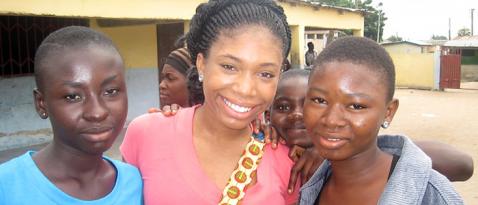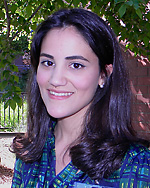Global Honors challenges students to engage with the world
Global Honors, UW Tacoma's undergraduate honors program, makes the world seem a smaller, more familiar place, according to its students.

UW Tacoma Global Honors students find myriad ways to prepare for life in an increasingly interconnected world. Consider:
- Lakeisha Davis studied in Ghana this summer, visited the country’s Parliament and taught Ghanaian children about HIV/AIDS.
- Dido Balla ’11 examined the international debate over whether torture can ever be justified.
- Lana Alisdairi ’11 interviewed Muslim women about their views on the wearing of head scarves and the body-covering burqa.
- Kelli Frank ’11 participated in a workshop in Munich to present research on the impact of online games on pre-teens.
The world becomes a smaller, more familiar place for students in Global Honors. The program offers stimulating classes, seminars and experiences to juniors and seniors who want to gain a sophisticated understanding of the intricacies of global interactions. Students are encouraged to study abroad and can get help obtaining travel fellowships.
“It is geared toward learning about the global village we are all part of,” said Orlando Martin, a communication major entering his senior year in the program. “That’s invaluable. That’s the world we live in now. I don’t think it’s going to change to the way it was before.”
The upper-division, two-year program doesn’t grant a degree. Instead, it attracts students and faculty from a variety of disciplines to foster a multidimensional perspective in discussions and projects. A business student, for instance, combined fieldwork in India with class work in both business and Global Honors programs to explore how NGOs (non-governmental organizations) and corporations effectively intervene in child labor issues, said Divya McMillin, program director.
A competitive edge
Students who successfully complete the program receive a “Global Honors” designation on their diploma, a certificate and pin — and a competitive edge as they enter the job market or graduate school.
The program accepts just 20 juniors each fall, and students take their honors courses together as a cohort.
“I like the idea that it’s such a small setting and that it’s really intimate. We really get to know each other,” said Davis, a politics, philosophy and economics major and Global Honors senior. “That makes it easier to talk about things in global issues and feel open to challenge each other.”
As the “Global Honors” name implies, classes are designed for highly motivated students.
High expectations
Davis has found professors have higher expectations and require more presentations, papers and sophisticated class discussion than in other classes.
“'Rigorous' is not a word to ignore,” Martin said. “It’s not just your breeze-through class that you show up to a couple times.”
Yet the high level of intellectual interaction makes the program all the more rewarding, they said.
In their senior year, students must present a paper that is globally focused. Students who study abroad may develop a shorter reflection paper based on their field experience. Those who don’t study abroad develop a thesis addressing a global issue in depth.
With the entire world as a prospective textbook, senior projects are as varied as individual interests.
Schizophrenia to human trafficking
At last spring’s Global Honors Colloquium, presentations from the 20 graduating seniors ranged from conflict resolution in Sudan, to schizophrenia in India, to human trafficking around the globe and in Washington state.

Lana Alisdairi, ’11, examined the stereotypes and reality behind Muslim women’s motivation for wearing — or not wearing — head scarves, veils and body-covering garb. Besides researching historic and contemporary writings, she interviewed six young adult Muslim women in the Puget Sound. Four of the women wore some type of veil or robe, yet even the two who did not wear them defended other women’s freedom to choose to wear the coverings.
“In our post-9/11 climate of tension between the West and Islam, I’ve learned Muslim women are caught in the crossfire,” she said during her presentation. “Muslim women navigate highly polarized framings of their identities as immigrants in the West by asserting their religious beliefs and forging hybrid identities, which intermix Western and Islamic values and norms.”
Meeting a king
Next spring, Davis will likely base her senior project on her just-completed study abroad in Ghana.
Organized by the UW Seattle campus for students in multiple majors, the tour took the travelers to impoverished and affluent communities and exposed them to Ghanaian drumming, dance and theater. They visited Parliament, a particularly interesting stop for Davis, who’s considering a career in law or education administration.
During the service-learning phase of the four-week study, Davis taught school children about HIV and AIDS prevention.
Another tour highlight: meeting the king of the Ashanti region. “It was something like out of a dream. We had to walk down a long carpet and bow to him,” she said.
The entire trip was a thrilling opportunity to learn by doing.
“It was a wide range of things we got to experience,” she said.



